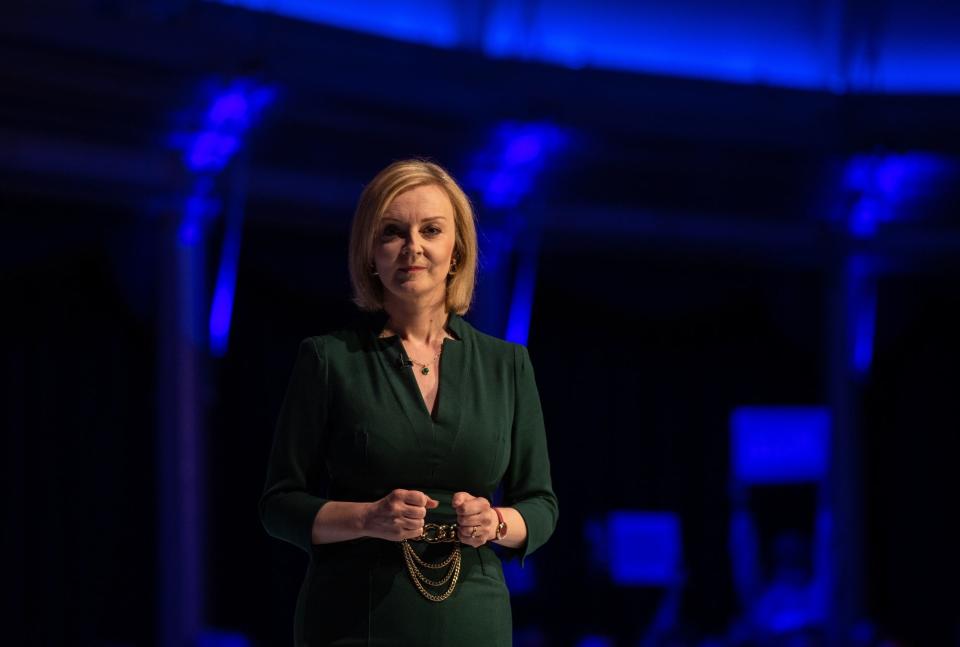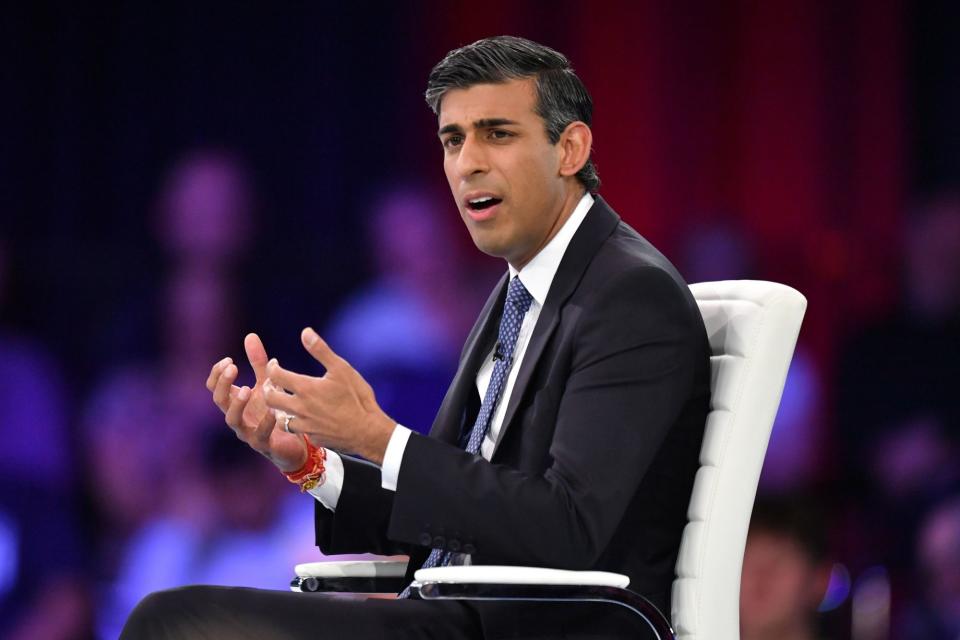City of London Sees Potential in Liz Truss’s ‘Radical’ Policies
- Oops!Something went wrong.Please try again later.
- Oops!Something went wrong.Please try again later.
(Bloomberg) --
Most Read from Bloomberg
Lukoil Chairman Ravil Maganov Dies After Falling From Hospital Window
Putin Brings China and India to Russia for War Games Defying US
Hong Kong Officials Target End to Hotel Quarantine in November
Jeremy Grantham Warns ‘Super Bubble’ in Stocks Has Yet to Burst
After an international career in finance, a rapid political rise and high profile as chancellor of the exchequer during the pandemic, Rishi Sunak must have expected the full-throated backing of the financial sector when he made a bid to lead the Conservative Party and the UK.
Instead, it’s Liz Truss who gained momentum among the financial establishment and Tory voters this summer.
Truss, currently foreign secretary and a former trade minister, has ideas that include altering the Bank of England’s remit, breaking up regulators and scrapping many more European Union rules to attract companies to London. And she’s spent recent weeks attempting to patch up relations between Downing Street and the City of London, which have taken a knock during Boris Johnson’s leadership.
The City is a “jewel in the crown of the UK economy but for too long its potential has been held back by onerous EU regulation, which have stifled growth and stunted investment,” Truss said in an interview with financial newspaper City AM published Wednesday.
While Truss’s policies have raised eyebrows, some in the financial services industry see the potential for a turning point after years in the political wilderness during the Brexit negotiations.
“Her whole philosophy is more radical,” said Barney Reynolds, global head of the financial services industry group at law firm Shearman & Sterling, who’s also done work for the Brexit-supporting European Research Group. “It will require immense effort and a lot of care and thought” to overhaul regulations, he added, “but it will lead to more growth.”
London Floats
Several polls of Conservative members have put Truss far ahead in the race with Sunak to replace Johnson, with just days of voting left before a winner is announced on Sept. 5.
Truss’s team wants to revive talks with SoftBank Group Corp. to encourage its Cambridge-based chip designer Arm to list shares in both London and New York, according to people familiar with her thinking. Plans for a UK listing hit the buffers during Johnson’s ousting in July.
Her campaign has also held internal discussions about bringing back Gerry Grimstone, who was leading government work on the Arm share sale, to resume the discussions, the people said, who asked not to be named as the information isn’t public.
While the decision about Arm’s float is ultimately out of the government’s hands, Truss sees future dual-listings as an attractive prospect for the UK, said the people.
“Clearly there is a need to move on from the period of benign neglect that was evident a few years ago, to recognizing the importance of the financial services sector,” said Gerard Lyons, chief economic strategist at online wealth manager Netwealth and former adviser to Johnson.
CEO Breakfast
Truss attended a breakfast in early August at the office of insurer Aviva Plc organized by Grimstone, a financier and Conservative peer who once worked under Truss as an unpaid minister at the Department of International Trade.
About 14 chief executives, chairmen and other individuals attended to hear her views and suggest measures to protect London’s status as a global hub for business and markets.
“In Liz we would have a prime minister who would take the City seriously. There is so much that can be done to benefit the UK by having a vibrant City,” Grimstone said in an interview.
Support for Truss is far from universal, though, in the City or the rest of the country. Several political and financial heavyweights such as former chancellor Nigel Lawson have warned that her plans to cut taxes would fuel rather than halt the UK’s spiraling inflation and not address the most pressing problem of imminent fuel poverty for millions of Britons.
It’s Sunak who has a “deep and forensic grasp of how the economy works and what needs to be done,” according to John Glen, the former City minister and a key supporter of the ex-chancellor. Sunak wants to invest in innovation and improve productivity, Glen told Bloomberg News.
Tax or Spend
If Truss does win, one of her first moves is expected to be an emergency budget, led by her new chancellor. Candidates for that job include business secretary Kwasi Kwarteng or Simon Clarke, chief secretary to the Treasury.
Tax is one area where the candidates more sharply divide. Sunak made spending commitments to support the economy through Covid that were anathema to many Conservatives and business people. He raised national insurance contributions, planned a hike in corporation tax, floated a levy on energy firms’ profit and launched a Covid-19 business loan program that’s set to lose billions of pounds to defaults and fraud.
Vasso Ioannidou, professor of finance at Bayes Business School in London, said Sunak was paying the price for his tax increases. “This unpopularity is more related to trust issues and deviation from traditional conservatism than competence or experience,” Ioannidou said.
Truss has promised to reverse the rise in national insurance and scrap the increased in corporate tax from 19% to 25% planned for next April. “We are particularly pleased the Truss campaign has listened to us on the need to cancel the planned corporation tax rise,” said Robert Colville, director of the Centre for Policy Studies, a popular source of ideas for the Conservative Party.
Similar Playbook
Away from this dividing line, though, both candidates are following a similar playbook on the financial industry. Colville said he was “pleased to see both campaigns take a more pro-business approach, over issues such as Solvency II.”
In the short term, reforms that are already in the works to gradually unburden the UK’s financial sector will likely continue. The Financial Services and Markets Bill, announced in July and prepared chiefly by Sunak’s Treasury, lays the groundwork for many EU-era laws to be scrapped.
Solvency II capital obligations for insurers could be tweaked, potentially unleashing £95 billion ($110 billion) for infrastructure, energy transition and housing projects, according to an Association of British Insurers estimate last year.
The UK could also dispense with more of the MiFID II regime that regulates financial markets in a bid to make platforms such as the London Stock Exchange more attractive to traders.
A number of financial services executives, who asked not to be named discussing politics, believe the government should go further to break with the EU’s regulations. Truss appears to agree. According to one of the people familiar with her thinking, there will be significant changes to the draft finance bill before it becomes law in April or May.
Sunak is also keen to rip up more laws inherited from the EU -- even though his own Treasury advisers previously said it might not be feasible.
Financial Regulation
Major changes are also looming for Britain’s financial regulators, which were split in two after the 2008 crisis to independently police the sector. Since Brexit, the Prudential Regulation Authority and Financial Conduct Authority have more leeway to adapt rules that were once set in Brussels -- and politicians including Truss and Sunak think this should come with more oversight.
The current draft of the financial services bill would give ministers the right to order regulators to review their actions. There’s talk of going further, with a “call-in” power that effectively vetos decisions.
On the campaign trail, Truss and her allies have floated this idea, and bigger overhauls such as merging the PRA and FCA, and changing parts of the Bank of England’s remit after it struggled to control inflation this year.
Critics argue this would expose regulators to interference. “It’s dangerous if you have a financial regulator that’s at the whim of politicians,” said Alan Miller, founder and chief investment officer at SCM Private LLP, who campaigned against Brexit. “If you have a Jacob Rees-Mogg style politician who doesn’t really believe in regulation but ‘buyer beware,’ this is in no one’s interest.”
The first showdown with regulators could be soon. Sam Woods, chief executive of the PRA, wants to preserve the matching adjustment within Solvency II, which dictates the assets an insurer must hold against its long-term liabilities. The ABI believes his ideas could mean some life insurers having to hold more capital overall.
A Truss win may make things particularly uncomfortable for Bank of England Governor Andrew Bailey. During her campaign, Truss has used the BOE as a political punching bag, criticizing its slowness to raise interest rates and its apparent reluctance to promote competitiveness as well as financial stability.
Finance Lobbying
A change in Downing Street gives lobbyists another opportunity to air their grievances. Some medium-sized banks want to see their capital levels reduced to boost their chances of competing with the big players. The long wait to obtain authorization frustrates fintech startups. The regulator’s new consumer duty for banks has stirred opposition and prompted criticism of FCA boss Nikhil Rathi.
TheCityUK is among the groups calling for speedier visa processes and other measures to make it easier to bring in skilled workers to the UK -- a cause they’ve been championing, to little effect, during the Brexit negotiations and Covid-19 disruption. It is also lobbying for further cuts to the levy on banks’ balance sheets and on VAT for fund management.
On Thursday, the City of London Corp. highlighted the barriers facing financial companies moving data across borders, saying post-Brexit free trade agreements haven’t gone far enough.
Truss -- or Sunak -- will have to weigh how far to go on all of these matters. It is a balancing act between striding out from the EU and aligning enough to allow cross-border business. There’s a risk of overreaching and damaging a sector that generates almost a tenth of UK economic output.
“What people say when they are at hustings and trying to win votes is quite often very different to what they do when they get power,” said Alasdair Haynes, chief executive officer and founder of stock platform Aquis Exchange Ltd. “We have to wait and see what she does.”
Most Read from Bloomberg Businessweek
Women Who Stay Single and Don’t Have Kids Are Getting Richer
The Secret Sauce at Hot Chicken Takeover: Its Unique Workforce
Russia’s Conspiracy-Theory Factory Is Swaying a Brand-New Audience
A New Contaminant Found in Popular Drugs Could Cost Big Pharma Millions
©2022 Bloomberg L.P.



